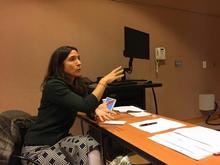Connected histories of the first South American republics

On October 16, a distinguished group of South American scholars met at Yale to discuss the history of the early republics of the region. The conference, titled “Connected Histories of the First South American Republics (1808-1850),” was part of a broader project called “War and Nation in South America,” funded by the Leverhulme Trust, which features a group of seven historians from Argentina, Chile, Colombia and Perú, who have been meeting regularly during the past two years to exchange ideas with local academic communities across Latin America. The project is particularly timely given the bicentennial anniversaries of the Independences of most South American nations during this decade.
Yale’s Marcela Echeverri launched the conversation with a general overview of the project. A first panel composed of Claudia Rosas (Pontificia Universidad Católic del Perú), Juan Luis Ossa Universidad Adolfo Ibáñez, Chile) and Alejandro Rabinovich Universidad Nacional de la Pampa, CONICET, Argentina) dealt with the with the transition from Spanish Monarchy to Independent South American republics as a process of sudden sociopolitical change and fragmentation. Rosas emphasized the emergence of “a new political order created on foundations different of those of the Old Regime, with new mechanisms and criteria for the organization of politics” during the early 19th century. Ossa explored the changing meanings of local sovereignty after the crisis of the Spanish Monarchy during the Napoleonic invasion of 1808. He focused on the process whereby the anticolonial armies led by José de San Martín and Simón Bolívar gave rise to a multiplicity of independent countries: “two armies that defended continental objectives became four armies divided by nationalities, organs of new national states.” For his part, Rabinovich argued, against traditional understandings of South America as a peaceful region based on the dearth of internationally recognized wars in the region, that the period was characterized by a permanent state of conflict and mobilization, but that they often were “wars of militia groups rather than national armies.” He explained that “local leaderships, provincial governments, and the fragmentation of political and military power were part of the unintended consequences” of the generalization of irregular warfare.
The second panel consisted of presentations by Gabriel Di Meglio (Instituto Ravignani, Universidad de Buenos Aires, CONICET), Marcela Echeverri, Daniel Gutiérrez (Universidad Externado de Colombia) and Natalia Sobrevilla (University of Kent). In the first talk, Di Meglio analyzed the political role of popular sectors in the context of the “reversion of power and sovereignty to the people” amidst the imperial crisis, and the “uncertainty, complaints over bad government, hopes for the restauration of the common good, demands for participation, and radicalization” that were pushed by egalitarian, anti-hierarchical popular movements. Echeverri’s paper proposed an interpretation of the manumission of enslaved peoples of African origin and the abolition of slavery in South America as a “political rather than overtly economic process,” based on “a political discourse that equated colonialism and slavery and on the strategic character of alliances between political elites and enslaved populations,” which was also deeply affected by the role of indigenous peoples. In his paper about the public sphere during the early republics, Gutiérrez argued that “a permanent anguish” dominated public debate, largely because the public intellectuals, journalists, and leaders of the time showed a remarkable “faith in the transformative power of institutions” to radically transform societies in the mold of what had happened in the United States of North America – only to find that change proved much more elusive in South America. Finally, Sobrevilla offered a broad examination of the rise of the national identities that are the Americas in the context of the current “bicentennial moment.” Her revision included “the essential colonial unit of the city council,” the different judicial and political units of the Habsburg and Bourbon colonial periods, and the centrifugal forces that shaped the different national projects of the nineteenth century, particularly during the “resolution” of national state-formation during the 1840s and 1850s.
In general terms, “Connected Histories of the First South American Republics (1808-1850)” provided a rare opportunity for scholars and the general public in the United States to establish a direct dialogue with South American historians working at the cutting edge of the discipline and on subjects of immediate interest in contemporary hemispheric debates.
The conference was sponsored by the Council on Latin American and Iberian Studies at the MacMillan Center.
Written by Adrián Lerner Patrón, a graduate student in the department of history.
